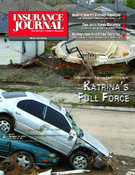State treasurers and controllers from around the country are urging major insurance companies to analyze and disclose their financial risk from climate change, warning that higher rates and loss of coverage are inevitable.
The officials, who oversee more than $800 billion in investments in the companies, said they are worried about escalating losses from hurricanes and other extreme weather. They say few insurers have examined the risks they face from climate change.
“U.S. insurers are facing a perfect storm of rising weather losses, rising global temperatures and more Americans than ever living in harm’s way,” said Mindy S. Lubber, president of Ceres, a coalition of institutional investors and environmentalists. “Insurers and regulators have failed to adequately plan for these escalating weather events that will have major long-term ramifications on insurance companies and their shareholders.”
But Robert Hartwig, chief economist of the Insurance Information Institute, said such an analysis is not necessary. He said any change in climate is gradual and insurers already take into account such changes when they analyze risks.
“Insurers are probably more experienced than almost any industry at adjusting to local changes in climate, whether they occur gradually or quickly,” Hartwig said. “No insurance regulator in the United States is going to allow an insurance company to increase its rates based on a so-called global climate change factor.”
The request comes after devastating back-to-back hurricane seasons that caused $30 billion in insured losses last year and as much as $60 billion in losses from Hurricane Katrina this year, officials said.
The officials, who are part of the investor coalition, warn that the losses will worsen if climate change trends continue and no action is taken to face the challenge.
They want insurers to complete climate risk reports by August 2006 that address the types of risks they face as well as opportunities for new markets and products related to climate change.
“While no individual weather event can ever be attributed to global warming, scientific data indicate that rising global temperatures will likely increase the frequency and intensity of hurricanes, floods, drought, wildfires and other extreme weather events and indeed may already be doing so,” the officials wrote in a letter to 30 publicly held insurance companies.
The group also released a report warning that climate change will result in more insurance claims, higher premiums and broader coverage restrictions.
Thomas J. Wilson, president and chief operating officer of The Allstate Corp., said that Americans face a “protection gap” as the risk of catastrophic disasters increases and the availability of affordable insurance decreases.
Allstate has cut back sharply on the number of homes it insures in Florida and has said it likely will take similar steps in Louisiana and other Gulf Coast states that were battered by hurricanes Katrina and Rita.
Wilson said “the increasing frequency and severity” of storms is exposing the insurance industry to the possibility of unacceptably large catastrophic losses. Some companies may stop writing policies altogether, he said. Others may increase deductibles and raise premiums to levels consumers would consider unfair.
“What we need is a government-sponsored, privately funded catastrophe pool” to deal with severe hurricanes and earthquakes, he said.
Wilson said such a system could be funded from higher premiums charged to homeowners and businesses in high-risk areas.
The letter to the insurers was sent by state treasurers and controllers from California, Connecticut, New York, Illinois, Kentucky, Maryland, North Carolina, Oregon and Vermont. The investors, who also include labor pension funds and a foundation, are part of the Investor Network on Climate Risk.
Was this article valuable?
Here are more articles you may enjoy.


 Uber Jury Awards $8.5 Million Damages in Sexual Assault Case
Uber Jury Awards $8.5 Million Damages in Sexual Assault Case  Former Ole Miss Standout Player Convicted in $194M Medicare, CHAMPVA Fraud
Former Ole Miss Standout Player Convicted in $194M Medicare, CHAMPVA Fraud  Allstate Doubles Q4 Net Income While Auto Underwriting Income Triples
Allstate Doubles Q4 Net Income While Auto Underwriting Income Triples  Zurich Insurance’s Beazley Bid Sets the Stage for More Insurance Deals
Zurich Insurance’s Beazley Bid Sets the Stage for More Insurance Deals 


